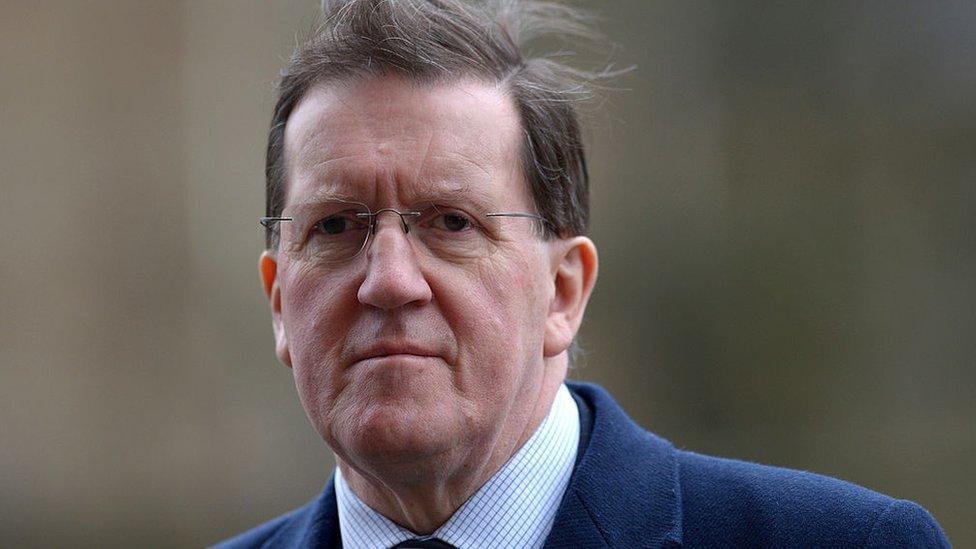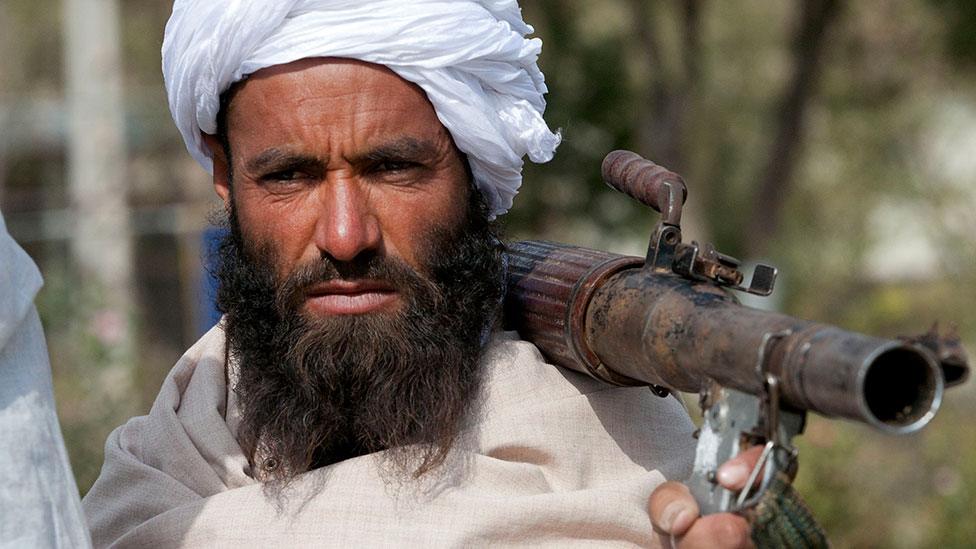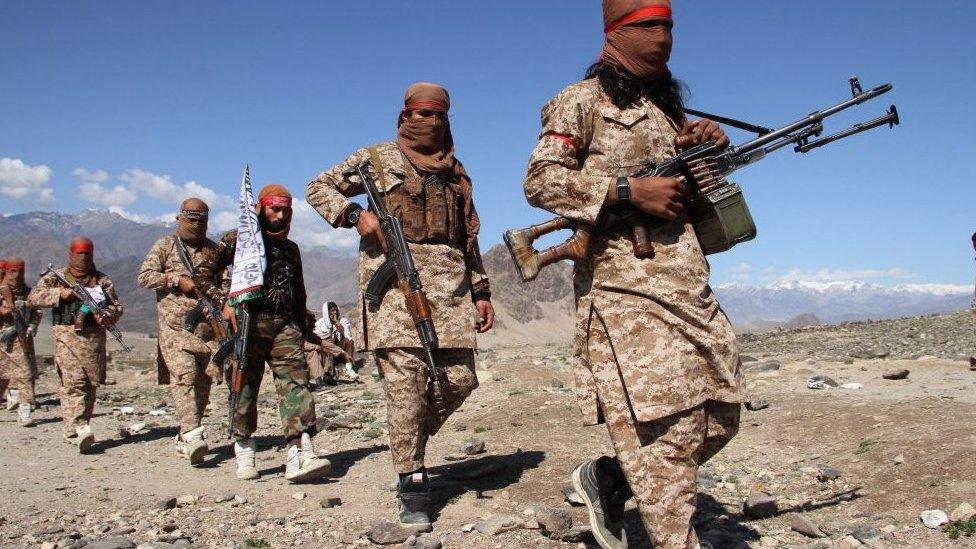Former Nato chief says UK must bolster terror defences after Afghan failure
- Published

George Robertson said there would be a "vacuum" in Afghanistan which could be filled by "nefarious" elements
The UK must build its defences against an increased threat of terrorism due to the Taliban takeover of Afghanistan, a former Nato chief has said.
George Robertson, a former defence secretary, was head of Nato at the time of the 2001 invasion.
He told BBC Scotland he was "sad and sickened" by events in Afghanistan.
And he said the Taliban's return had attracted "a whole host of jihadists" from other countries - who could ultimately strike elsewhere.
The Islamist group says it wants a "peaceful transfer of power", and a spokesman told the BBC there would be no "revenge" on the people of Afghanistan.
With the UK parliament to be recalled on Wednesday, Prime Minister Boris Johnson said nobody wanted the country to become a "breeding ground for terror".
George Robertson was MP for Hamilton and shadow Scottish secretary under Tony Blair, before becoming defence secretary when Labour swept to power in 1997.
He was then made a life peer as Baron Robertson of Port Ellen - the town in Islay where he was born - and then became secretary general of the North Atlantic Treaty Organisation (Nato) in 1999.
He was in charge at the time of the September 11, 2001 attacks in the US, and of the subsequent invasion of Afghanistan.
He told the BBC's Good Morning Scotland programme: "I was the one who read out the statement 20 years ago invoking article five of the North Atlantic treaty, saying an attack on the US was an attack on all the countries in Nato.
"I find it ironic at best but tragic at worst that the anniversary of 9/11 is going to be commemorated in a few weeks' time with the Taliban back in control of Kabul. It is deeply, deeply depressing."

Baron Robertson said the collapse of the Afghan regime was "almost inevitable" after it was confirmed that Western troops were pulling out of the country, and said there had been a "huge failure of intelligence" which left leaders believing the Taliban would not take over swiftly.
And he said the UK now needed to build greater "resilience" against "a terrorist threat that is likely to increase in future".
He said: "The longer term implications are going to be very worrying indeed. The rise of a terrorist threat that can affect us in the streets of this country, the humiliation of the eyes in the eyes of the authoritarians in the world today - all of these are long term consequences which are certainly going to haunt us.
"There is going to be a vacuum, and it will be filled by all sorts of nefarious sources.
"Although the Taliban are saying publicly they are not going to host terrorist groups, they are not in a position to control the whole of Afghanistan. And in order to command the victory that has been seen there, they have attracted a whole host of jihadists from other parts of the world.
"They are the ones who are going to present the greatest threat. We went in in 2001 in order to make sure that Afghanistan was not going to host international jihadist terrorists. I fear we are now back in a position where Afghanistan could easily host those elements again."
2021: Chaotic scenes at Kabul airport
Hundreds of British nationals are being evacuated from the country, along with Afghans who worked for British forces. Last week, the government said about 2,000 interpreters and "other people we have an obligation to" would be transported to the UK, joining about 3,000 who have already been taken out of the country.
The Taliban has claimed victory after taking over the capital, Kabul, but Defence Secretary Ben Wallace said the military part of the airport there was still open and secure - enabling those eligible to leave for the UK.
Baron Robertson said he thought it was unlikely that UK troops would return to Afghanistan, saying the war was "an episode we'll have to reflect on and learn lots of lessons from".
He said the UK should now "help those who helped us" in Afghanistan swiftly and generously, and said cuts to humanitarian aid programmes must be reversed.
He added: "What we need to make sure of is that our own defences are much more resilient as a consequence of this particular failure, and we have to watch what the international ramifications are - they will not be good."
'This is real people'
Some veterans of the 20-year conflict have voiced dismay at how it has ended.
Scott Methven, a former soldier who did two tours in Afghanistan, latterly with the Argyll and Southern Highlanders, told BBC Scotland's Lunchtime Live programme that many of his friends believed the government had "turned their back" on the sacrifices made.
He said: "We lost a lot of men and women, dead and seriously injured.
"This isn't just a TV programme for us. This is real people. We went out there and convinced them, we will support you. We just know that people will be in the background, waiting for retribution - and I really fear for people in the coming months and years.
"Everyone must remember why we went there in the first place - it was to hopefully stop terrorism. It really is going to give the Taliban a shot in the arm. The presumption around the Middle East will be that the West has been defeated, the Taliban are strong and I fear it's just going to be a great recruiting tool."
Allow X content?
This article contains content provided by X. We ask for your permission before anything is loaded, as they may be using cookies and other technologies. You may want to read X’s cookie policy, external and privacy policy, external before accepting. To view this content choose ‘accept and continue’.
The Westminster parliament is to be recalled from its summer recess on Wednesday to discuss the situation.
Mr Johnson said things were "extremely difficult" on the ground, and that the priority was to get UK nationals and "all those who have helped the British effort in Afghanistan over 20 years" out of the country as fast as possible.
And he called on other countries not to "prematurely" recognise the Taliban, adding: "What we're dealing with now is very likely the advent of a new regime in Kabul. We don't know yet exactly what kind of regime it will be."
Meanwhile, Scottish First Minister Nicola Sturgeon said the events in Afghanistan were a "tragedy", and that "the Afghan people have been shamefully abandoned".
In a tweet, she said her government was willing to play its full part in offering refuge to vulnerable Afghans and to "do all we can to help those in peril as a result of the horrifying situation currently unfolding".
Related topics
- Published16 August 2021

- Published12 August 2022
